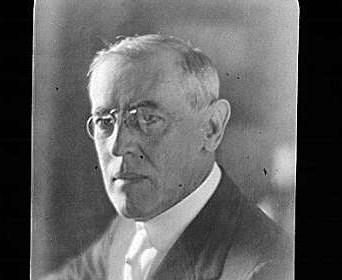
Section Branding
Header Content
Woodrow Wilson’s Civil War Childhood Shaped His Presidency
Primary Content

President Woodrow Wilson is the subject of a new book by Pulitzer-prize winning biographer A. Scott Berg entitled “Wilson”. Berg won that honor for his biography of Charles Lindberg, but he’s been fascinated by Wilson since his teenage years. Woodrow Wilson grew up in Augusta during the Civil War, which Berg argues is why Wilson saw the world through the lens of the South and from the point of view of a defeated nation.
Wilson was the son of a Presbyterian minister and his family moved to Augusta when Wilson was one year old. Berg says Wilson’s very first childhood memory was of hearing that Abraham Lincoln got elected and there was going to be a war. “Wilson was not yet 4 years old but he really carried that with him. And he’s the only President we’ve had who grew up in a defeated nation, the Confederate States of America. So Wilson carried some of that too.”
Wilson’s father allowed his church to be used as a confederate hospital, so the young boy saw all the horrors of what war can do. Berg argues that led Wilson to be hesitant to bring the country into World War I when he became President.
Wilson was elected to the White House in 1913, and in 1914, World War I began. He kept the U.S. out of the conflict for three years. But Berg says in 1917 Wilson realized the Germans were only stepping up their militarism. They weren’t responding to Wilson’s diplomatic efforts and had torpedoed even neutral ships, killing Americans. Wilson gave a speech that not only called for America to go to war, Berg points out “ There was one sentence embedded in that speech that really has become the cornerstone of all American foreign policy for the last century. And that one line is ‘The world must be made safe for democracy’.”
Berg believes Wilson was an outstanding President. He says in Wilson’s first two or three years in office he got passed the greatest progressive agenda this country had seen. Berg stresses that Wilson was able to lower tariffs that had been in place for years, he introduced the modern income tax.” He presented and got passed the federal reserve system which for the last century has been really the bedrock of the American economy.” Berg also lists the eight hour workday and workman’s compensation among Wilson’s accomplishments.
But Berg admits Wilson had his flaws. While 100 years ago Wilson was considered a centrist on racial issues, he was a segregationist. “His southerness really comes into play in the matter of race, which was something he wrestled with most of his life. And probably never succeeded in dealing with. “
Berg says Wilson just didn’t believe the South was ready to integrate. “There were a couple of moments where he could have stood up and really made a difference in this country racially.” Berg says after World War I when African-American soldiers returned home after laying their lives on the line, they expected to be treated as full Americans and they were not. Berg believes Wilson could have really changed the country, but he allowed segregation to move forward.
After the War, Wilson wanted to ensure a fair peace, and he proposed the League of Nations, where countries would join together to resolve disputes.
Republicans in Congress were determined to stop that idea. So Wilson took off on a national tour to convince the country it was a good idea. The trip ruined his health, and he had to be rushed back to the White House, where he suffered a stroke. Berg says for the next 18 months, Wilson’s second wife and his doctors covered up his illness so the public never knew how incapacitated he was. Berg called that the greatest conspiracy ever to unfold in the White House.
Tags: Civil War, World War I, A. Scott Berg, Woodrow Wilson
